
Arthur Rothstein “Quack doctor, Pittsburgh, Pennsylvania” 1938

Not much room left to move, it would seem. And the Supreme Court is still some distance away, if the case even gets there.
• Hawaii Judge Halts Trump’s New Travel Ban Before It Can Go Into Effect (R.)
Just hours before President Donald Trump’s revised travel ban was set to go into effect, a U.S. federal judge in Hawaii on Wednesday issued an emergency halt to the order’s implementation. The action was the latest legal blow to the administration’s efforts to temporarily ban refugees as well as travelers from six predominantly Muslim countries, which the President has said is needed for national security. Trump lashed out at the judge’s ruling, saying it “makes us look weak.” Trump signed the new ban on March 6 in a bid to overcome legal problems with a January executive order that caused chaos at airports and sparked mass protests before a Washington judge stopped its enforcement in February. U.S. District Judge Derrick Watson put an emergency stop to the new order in response to a lawsuit filed by the state of Hawaii, which argued that the order discriminated against Muslims in violation of the U.S. Constitution.
Judge Watson concluded in his ruling that while the order did not mention Islam by name, “a reasonable, objective observer … would conclude that the Executive Order was issued with a purpose to disfavor a particular religion.” Watson was appointed to the bench by former Democratic President Barack Obama. Speaking at a rally in Nashville, Trump called his revised executive order a “watered-down version” of his first. “I think we ought to go back to the first one and go all the way, which is what I wanted to do in the first place,” Trump said. Trump called the judge’s block “unprecedented judicial overreach” and said he will take the case “as far as it needs to go,” including to the U.S. Supreme Court. The Department of Justice called the ruling “flawed both in reasoning and in scope,” adding that the president has broad authority in national security matters. “The Department will continue to defend this Executive Order in the courts,” it said a statement.
[..] The government, in its court filings cautioned the court against looking for secret motives in the executive order and against performing “judicial psychoanalysis of a drafter’s heart of heart.” Watson said he did not need to do that, because evidence of motive could be found in the president’s public statements. He said he did not give credence to the government’s argument that the order was not anti-Muslim because it targeted only a small percentage of Muslim-majority countries. “The notion that one can demonstrate animus toward any group of people only by targeting all of them at once is fundamentally flawed,” the judge wrote.

The military-industrial complex.
• Trump Proposes Historic Cuts Across Government to Fund Defense (BBG)
President Donald Trump is proposing historically deep budget cuts that would touch almost every federal agency and program and dramatically reorder government priorities to boost defense and security spending. The president’s fiscal 2018 budget request, which will be formally delivered Thursday to Congress, would slash or eliminate many of the Great Society programs that Republicans have for decades tried to peel back while showering the Pentagon and Department of Homeland Security with new resources. Some of the deepest cuts are reserved for the agencies and programs Trump has often derided. The State Department would be hit with a 28% reduction below fiscal 2016 levels that mainly targets international aid and development assistance; the EPA would face a 30% reduction.
Also in the crosshairs are agriculture programs, clean energy projects and federal research funding. “You see reductions in many agencies as he tries to shrink the role of government, drive efficiencies, go after waste, duplicative programs,” Office of Management and Budget Director Mick Mulvaney told reporters. “If he said it in the campaign, it’s in the budget.” Trump’s proposal for $1.15 trillion in federal discretionary funding for fiscal year 2018 is certain to face vigorous opposition from lawmakers in both parties who will resist chopping favored programs, whether foreign aid, rural water projects, or development grants for Appalachia and the Mississippi Delta. In addition to a solid wall of opposition from Democrats, senior Republicans including Senate Majority Leader Mitch McConnell have raised objections to specific agency cuts even before the budget request went to the Capitol.
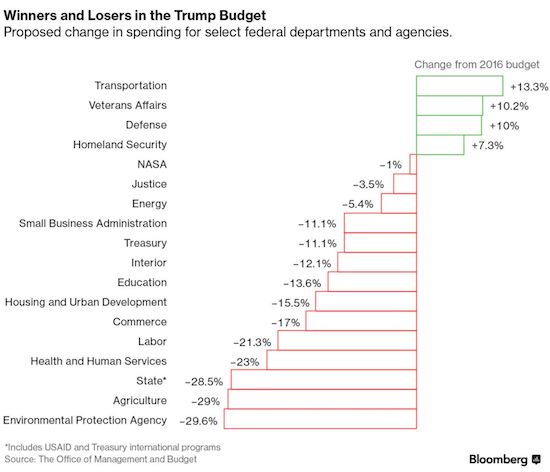

It’s all about credibility. “Fighting inflationary pressures”?!
• Janet Yellen Explains Why She Hiked In A 0.9% GDP Quarter (ZH)
It appears that, the worse the economy was doing, the higher the odds of a rate hike.

Putting the Federal Reserve's third rate hike in 11 years into context, if the Atlanta Fed's forecast is accurate, 0.9% GDP would mark the weakest quarter since 1980 in which rates were raised (according to Bloomberg data).

We look forward to Ms. Yellen explaining her reasoning – Inflation no longer "transitory"? Asset prices in a bubble? Because we want to crush Trump's economic policies? Because the banks told us to?
For now it appears what matters to The Fed is not 'hard' real economic data but 'soft' survey and confidence data…

“..raising interest rates off ultralow levels during a period of tepid economic growth coincides with recessions in the following three to nine months..”
• Fed Rate Hikes + Low Growth = Recession (MW)
The Federal Reserve on Wednesday lifted benchmark interest rates for only the third time in about a decade, and that has caused trepidation among some market participants. Lance Roberts, chief investment strategist at Clarity Financial, makes the case in one chart that raising interest rates off ultralow levels during a period of tepid economic growth coincides with recessions in the following three to nine months (see chart below, which compares real, inflation-adjusted, GDP to Fed interest rate levels).
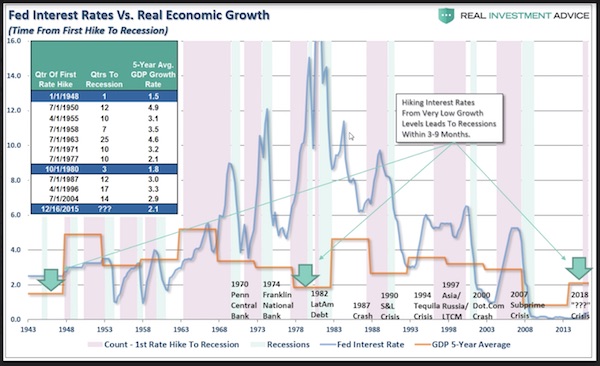
The Fed lifted key rates by a quarter-point Wednesday to a range of 0.75% to 1%. The rate increase comes as the U.S. economy has been growing at a lackluster pace. Government data show that gross domestic product—the official report card of economic performance—was growing at a seasonally adjusted pace of 1.9% in the fourth quarter compared with 1.6% in 2016 and 2.6% in 2015. “Outside of inflated asset prices, there is little evidence of real economic growth, as witnessed by an average annual GDP growth rate of just 1.3% since 2008, which by the way is the lowest in history since…well, ever,” Roberts wrote in a blog post March 9 (see chart below):
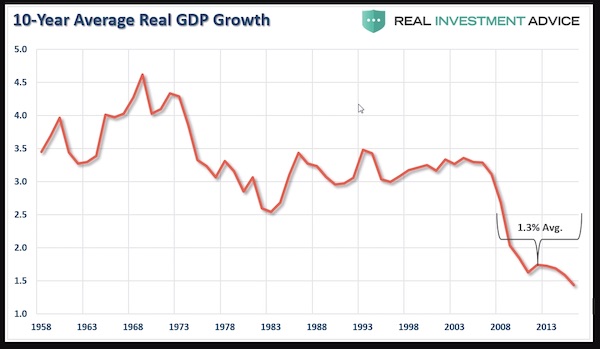
Woeful productivity, defined as the average output per hour of work, has been another bugaboo for economists and the Fed, for the past six years. Higher rates could exacerbate both problems, especially since corporations tend to benefit when borrowing costs are low. Roberts told MarketWatch in a recent interview that the “Fed lifts interest rates to slow economic growth and quell inflationary pressures.” He argues that outside of a stock market that has been mostly zooming higher, “economic growth is weak.”

Debtors get screwed, savers get some air. Sounds cute and all, but there’s so much debt out there.
• How The Fed Rate Hike Will Impact Millions Of Americans (MW)
Bad news for those with credit card debt: The Federal Reserve hiked its key rate on Wednesday by a quarter%age point and, as a result, your own interest rates could rise almost immediately. The Fed raised the rate for federal funds by a quarter%age point, to 0.75% to 1% at the end of its two-day meeting on Wednesday, and signaled two further rates rises in 2017. In other words, the Fed announced an increase in how much banks will be charged to borrow money from Federal Reserve banks. (The Fed raises and lowers interest rates in an attempt to control inflation.) That increase will most likely eventually be passed on to consumers, said Sean McQuay, a credit card expert at the personal finance website NerdWallet. Many households with credit card debt — the average household carrying credit card debt has more than $16,000 — will likely take a hit. Here’s how the latest Fed rate increase could impact your credit cards and bank accounts.
Credit cards Because a rise in the federal funds rate means banks will likely pay more to borrow from the Federal Reserve, they may pass that cost on to consumers. Credit card interest rates are variable (banks and credit card companies should state that their rates are variable in the literature customers receive to learn about their cards), and they are tied to the prime rate, an index a few%age points above the federal funds rate. It is a benchmark that banks use to set home equity lines of credit and credit card rates; as federal funds rates rise, the prime rate does, too. As a result, credit card holders are likely to see their interest rates rise, and that will happen soon, said Greg McBride, the chief financial analyst at the personal finance company Bankrate, told MarketWatch.

Written just before Yellen’s hike.
• How Global Central Banks Have Set Interest Rates Since 2008 (Tel.)
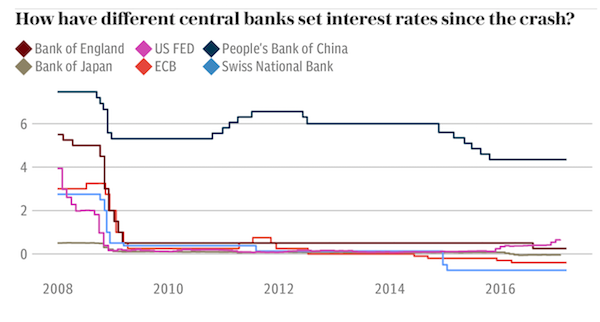
After the financial crisis in 2008 central banks across the world cut their base lending rates to varying degrees, with some introducing negative rates of interest. [..] The US economy has performed strongly in recent months, leading Fed chair Janet Yellen to say that policymakers are now ready to change their stance on interest rates. The expectation is that there will be a steady hike in rates in the coming years and that, in the longer term, interest rates should be hovering around 3pc. Market traders are predicting three interest rate rise in the US this year alone. Ms Yellen has said that waiting too long to raise interest rates risked more rapid increases later if the economy started to overheat. If the Fed does see fit to continue to increase interest rates, it could signal the start of a similar pattern in other countries that have, thus far, kept rates very low since the financial crisis.
The Bank of England’s base lending rate stood at 5.75pc in July 2007 but was slashed repeatedly in the following months and years. Since March 2009 the Bank’s lending rate has been languishing below 1pc. In contrast to the expected direction of interest rates in the US, last August BoE Governor Mark Carney cut the rate again from 0.5pc to 0.25pc. [..] The ECB’s deposit rate has been at -0.4pc since early 2016 while the Swiss National Bank’s lending rate has been even lower than this. Mark Carney has said that the next move on interest rates in the UK will be an upward one but that it will be “limited and gradual”. However with the economic uncertainty surrounding Brexit it may be some time before rate rises catch up with the US. And it is likely to be some time before the ECB feels it can gamble with a significant rate rise.

June 1 drop-off.
• Beware the Debt Ceiling (BBG)
Euphoria has been pervasive in the stock market since the election. But investors seem to be overlooking the risk of a U.S. government default resulting from a failure by Congress to raise the debt ceiling. The possibility is greater than anyone seems to realize, even with a supposedly unified government. In particular, the markets seem to be ignoring two vital numbers, which together could have profound consequences for global markets: 218 and $189 billion. In order to raise or suspend the debt ceiling (which will technically be reinstated on March 16), 218 votes are needed in the House of Representatives. The Treasury’s cash balance will need to last until this happens, or the U.S. will default. The opening cash balance this month was $189 billion, and Treasury is burning an average of $2 billion per day – with the ability to issue new debt.
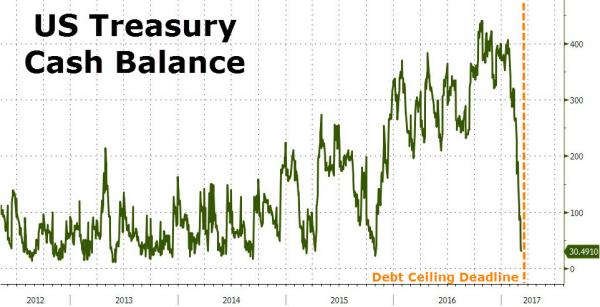
Net redemptions of existing debt not held by the government are running north of $100 billion a month. Treasury Secretary Steven Mnuchin has acknowledged the coming deadline, encouraging Congress last week to raise the limit immediately. Reaching 218 votes in favor of raising or suspending the debt ceiling might be harder than in any previous fiscal showdown. President Donald Trump almost certainly wants to raise the ceiling, but he may not have the votes. While Republicans control 237 seats in the House, the Tea Party wing of the party has in the past has steadfastly refused to go along with increases. The Republican Party is already facing a revolt on its right flank over its failure to offer a clean repeal of the Affordable Care Act. Many members of this resistance constitute the ultra-right “Freedom Caucus,” which was willing to stand its ground during previous debt ceiling showdowns.
The Freedom Caucus has 29 members, which means there might be only 208 votes to raise the ceiling. (It’s interesting to recall that, in 2013, President Trump himself tweeted that he was “embarrassed” that Republicans had voted to extend the ceiling.) It may be unrealistic to expect Democrats to save the day – at least initially. House Democrats may be more than happy to sit back and watch Republicans fight among themselves. If the Democrats eventually ride to the rescue, it probably won’t be until after a period of Republican-on-Republican violence. Nobody wants the Treasury to reach the point where it has to prioritize payment of interest over other obligations – a threshold where creditworthiness and market confidence will have begun to retreat. The bond market already seems to be reacting to this possibility, sending yields higher and prices lower, even as the S&P/Dow/Nasdaq have been on a tear and are showing scant concern over the potential turmoil.

Change with an enormous impact. Do we really want this?
• Amazon Is Going To Kill More American Jobs Than China Did (MW)
Amazon.com has been crowing about its plans to create 100,000 American jobs in the next year, but as with other recent job-creation announcements, that figure is meaningless without context. What Amazon won’t tell us is that every job created at Amazon destroys one or two or three others. What Jeff Bezos doesn’t want you to know is that Amazon is going to destroy more American jobs than China ever did. Amazon has revolutionized the way Americans consume. Those who want to shop for everything from books to diapers increasingly go online instead of to the malls. And for about half of those online purchases, the transaction goes through Amazon.
For the consumer, Amazon has brought lower prices and unimaginable convenience. I can buy almost any consumer product I want just by clicking on my phone or computer — or even easier, by just saying: “Alexa: buy me one” — and it will be shipped to my door within days or even hours for free. I can buy books for my Kindle, or music for my phone instantly. I can watch movies or TV shows on demand. But for retail workers, Amazon is a grave threat. Just ask the 10,100 workers who are losing their jobs at Macy’s. Or the 4,000 at The Limited. Or the thousands of workers at Sears and Kmart, which just announced 150 stores will be closing. Or the 125,000 retail workers who’ve been laid off over the past two years.
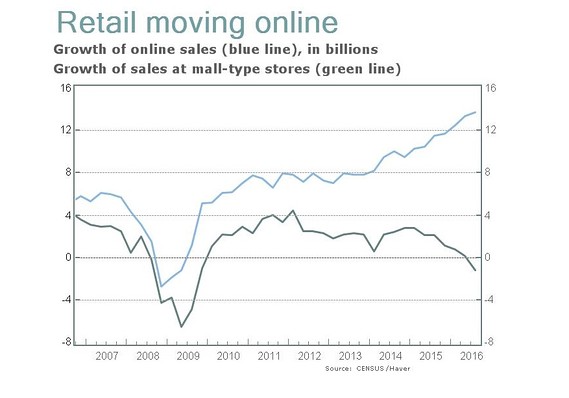
Amazon and other online sellers have decimated some sectors of the retail industry in the past few years. For instance, employment at department stores has plunged by 250,000 (or 14%) since 2012. Employment at clothing and electronics stores is down sharply from the earlier peaks as more sales move online. “Consumers’ affinity for digital shopping felt like it hit a tipping point in Holiday 2014 and has rapidly accelerated this year,” Ken Perkins, the president of Retail Metrics, wrote in a research note in December. And when he says “digital shopping,” he really means Amazon, which has increased its share of online purchases from about 10% five years ago to nearly 40% in the 2016 holiday season.

Rutte lost big and is the winner.
• PM Mark Rutte Sees Off Challenge Of Geert Wilders In Dutch Election (G.)
The Dutch prime minister, Mark Rutte, has seen off a challenge from the anti-Islam populist Geert Wilders to claim a resounding victory in parliamentary elections widely seen as a test for resurgent nationalism before key European polls. With nearly 95% of votes counted and no further significant changes expected, Rutte’s centre-right, liberal VVD was assured of 33 MPs, by far the largest party in the 150-seat Dutch parliament, national news agency ANP said. Wilders’ Freedom party (PVV) looked certain to finish second, but a long way behind on 20 seats, just ahead of the Christian Democrat CDA and liberal-progressive D66 which both ended up in third position on 19 seats. “Our message to the Netherlands – that we will hold our course, and keep this country safe, stable and prosperous – got through,” Rutte told a cheering crowd of supporters at the VVD’s election night party.
After Britain’s shock Brexit vote and Donald Trump’s presidential victory in the US, he added, the eyes of the world had been on the vote: “This was an evening when … the Netherlands said ‘Stop’ to the wrong sort of populism.” A first-place finish for the anti-immigration, anti-EU PVV would have rocked Europe. In France, the far-right leader Marine Le Pen is expected to make the second-round runoff in the presidential election in May, while the Eurosceptic Alternative für Deutschland (AfD) is on target to win its first federal parliament seats later in the year. Relieved European politicians were quick to applaud. A spokesman for European commission president Jean-Claude Juncker hailed “a vote against extremists” while French foreign minister Jean-Marc Ayrault tweeted: “Congratulations to the Netherlands for halting the advance of the far right.”

What’s going to be left by the time Brexit is reality?
• Northern Ireland Vote Jolts Already Disunited Kingdom (R.)
A nationalist surge at elections in Northern Ireland and a Scottish demand for a second independence referendum have raised doubts over whether the United Kingdom can hold together after it leaves the European Union. Last year’s referendum on EU membership saw England and Wales vote to leave while Scotland and Northern Ireland voted to remain, straining the ties that bind the UK together. Scottish leader Nicola Sturgeon dealt a blow to British Prime Minister Theresa May on Monday by demanding a new vote on independence in late 2018 or early 2019, making her move much sooner than expected. But while the Scottish issue had been well flagged since the Brexit vote, a snap provincial assembly election in Northern Ireland produced a genuine shock: for the first time since the partition of Ireland in 1921, unionists lost their majority.
Nationalist party Sinn Fein, backed by many of Northern Ireland’s Catholics, narrowed the gap with the Democratic Unionist Party, whose support base is among pro-British Protestants, to just one seat. This has revived the slow-burning question of whether Northern Ireland will stay in the United Kingdom over the long term or become part of the Republic of Ireland. This could be achieved by a referendum, often referred to as a border poll. “A border poll might be 10 years away and it might still be lost, but clearly this election has shown a different dynamic in Northern Ireland politics,” said Peter Shirlow, Director of Irish Studies at the University of Liverpool. “This opens the door for a different scenario.”

No visa-free travel either.
• Erdogan, Europe Head for Political Blow-Up They Can’t Afford (BBG)
Politicians in Turkey and the European Union stoking tensions for short-term electoral gain may have done lasting damage to vital economic and security ties. While relations between the EU and Turkey have been rocky for years, the furor of recent days – with Turkish President Recep Tayyip Erdogan freely hurling the Nazi epithet at his western antagonists – marks a rift that could prove irreparable. Turkey has been negotiating EU membership since 2005, but progress has come close to a halt. “Even without anyone saying it, Turkey’s EU membership talks will go into an irreversible coma now,” said Marc Pierini, who served as the EU’s ambassador to Turkey from 2006-2011 and is a visiting scholar at Carnegie Europe, a Brussels-based think tank. “That will suit everybody, except Turkey’s democrats.”
[..] Pierini sees a wider clash between two populisms – one anti-Muslim in Europe, and the other fighting for the Islamization of the secular Turkish Republic – that risks an uncontrolled downward spiral. Europe’s leaders, he said, “are losing sight of the fundamentals, that you have a counter-revolution going on in Turkey,” where Erdogan is trying to reverse the westward course on which Mustafa Kemal Ataturk set the country in 1923. Hanging in the balance is a deal struck a year ago, under which Turkey agreed to cooperate in stemming the flow of refugees from Syria. In exchange, the EU provided more than $3 billion in economic aid and pledges both to “re-energize” Turkey’s stalled membership talks and deliver visa-free travel for Turks entering the 26-nation Schengen area, both of which are increasingly politically toxic for EU leaders.

Where it hurts.
• Turkey Protests Dutch Government by Returning 40 Holstein Cows (BBG)
Two months after a Turkish butcher broke the Internet, the country’s red meat producers are trying a novel way to break the Dutch government’s resolve. Members of the Ankara-based Beef and Lamb Producers Association have sent 40 Holstein cows back to the Netherlands to show their displeasure at a decision to prevent Turkish ministers from conducting political campaigning on their soil, the association’s chairman Bulent Tunc said in telephone interview. A fiery diplomatic spat has erupted between the two countries after the EU state, which is holding its own elections on Wednesday, refused access to Turkish ministers seeking to campaign on a referendum to expand President Recep Tayyip Erdogan’s powers.
While Tunc called the number of cows being shipped away “symbolic,” he spoke of widespread support for the Turkish president’s stance among association members, who number 160,000. Those involved in the cattle trade are also considering putting a stop to purchases of tractors, equipment, feed and bull semen — and extending the boycott to Austria, which Tunc accused of sharing the Dutch government’s stance. “There are many alternatives,” he said, citing Brazil and Romania as possibilities. “Turkey is a huge market for livestock imports and countries are dying to get in.”

More Greek tragedies. Imagine having to give up age-old family homes and/or land because you can’t afford taxes.
• Spike In Number Of Greeks Renouncing Inheritance To Avoid Taxes (K.)
An increasing number of people are turning their backs on properties they have inherited to avoid paying the higher taxes that accompany them, according to new data from the country’s courts which show that applications for renunciation of property rose 86.4% last year compared to 2013. According to the latest statistics, which were made public on Wednesday, a total of 54,422 such applications were lodged with the country’s local courts last year, compared to 45,628 in 2015 and 29,199 in 2013. Experts attribute the rise to the tremendous increase in property taxes that successive governments have imposed over the years as part of bailout agreements with Greece’s creditors. According to official figures, property owners paid seven times more in taxes last year compared to 2009, the year before the crisis hit.
In 2009, property taxes did not exceed €500 million, while revenue collected from property reached €3.5 billion last year. Most of those who filed documents last year to renounce their inheritance did so in the country’s major cities, with 11,655 applications recorded in Athens, 5,563 in Thessaloniki, 1,938 in Piraeus and 1,473 in Patra. People are not only giving up family houses and apartments but also plots of lands. According to Nikos Stasinopoulos, formerly the head of the association representing Greek notaries, many people in the provinces give up inherited land even when the tax they would have to pay on it is relatively small. He offered the example of one beneficiary in the region of Gortynia who gave up a plot on which he faced a €150 levy, and a second who inherited a total of 98 plots of land in the region of Larissa from his father and aunt and was “relieved” to discover that he could hand them over to the state to avoid paying tax.

We have lost all wisdom. Only native peoples have any left.
“..all Maori tribes regard themselves as part of the universe, at one with and equal to the mountains, the rivers and the seas.”
• New Zealand River Granted Same Legal Rights As Human Being (G.)
In a world-first a New Zealand river has been granted the same legal rights as a human being. The local Maori tribe of Whanganui in the north island has fought for the recognition of their river – the third-largest in New Zealand – as an ancestor for 140 years. On Wednesday, hundreds of tribal representatives wept with joy when their bid to have their kin awarded legal status as a living entity was passed into law. “The reason we have taken this approach is because we consider the river an ancestor and always have,” said Gerrard Albert, the lead negotiator for the Whanganui iwi [tribe]. “We have fought to find an approximation in law so that all others can understand that from our perspective treating the river as a living entity is the correct way to approach it, as in indivisible whole, instead of the traditional model for the last 100 years of treating it from a perspective of ownership and management.”
The new status of the river means if someone abused or harmed it the law now sees no differentiation between harming the tribe or harming the river because they are one and the same. Chris Finlayson, the minister for the treaty of Waitangi negotiations, said the decision brought the longest-running litigation in New Zealand’s history to an end. “Te Awa Tupua will have its own legal identity with all the corresponding rights, duties and liabilities of a legal person,” said Finlayson in a statement. “The approach of granting legal personality to a river is unique … it responds to the view of the iwi of the Whanganui river which has long recognised Te Awa Tupua through its traditions, customs and practise.” Two guardians will be appointed to act on behalf of the Whanganui river, one from the crown and one from the Whanganui iwi.
Albert said all Maori tribes regarded themselves as part of the universe, at one with and equal to the mountains, the rivers and the seas. [..] “We can trace our genealogy to the origins of the universe,” said Albert. “And therefore rather than us being masters of the natural world, we are part of it. We want to live like that as our starting point. And that is not an anti-development, or anti-economic use of the river but to begin with the view that it is a living being, and then consider its future from that central belief.”










Home › Forums › Debt Rattle March 16 2017